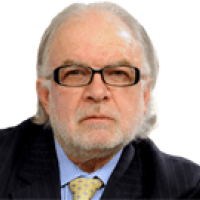Erdogan’s face-off with the ‘enemies of the people’
Turkish President Recep Tayyip Erdogan is a confusing character. He claims to be an Islamist but then he is not, really. He supports the Muslim Brotherhood but has not hesitated to arrest some of its members. He has not prevented some from being tortured and killed.
In his book, it seems perfectly all right to kill fellow Muslims, provided, of course, that they are Kurds. Erdogan equates “Kurd” with “terrorist” and if they happen to be Kurdish journalists, all the more reason.
Or perhaps Erdogan is a true European democrat who not too long ago had dreams of joining the European Union. Then again, he is neither European nor is he much of a democrat. Try demagogue, instead. The title fits better with the character.
Speaking of demagogues, Erdogan’s new best friend seems to be a former comrade of the KGB for East Germany, Russian President Vladimir Putin.
Being a member of NATO has not prevented Erdogan from cosying up to Moscow nor did it prevent him from purchasing Russian weapons, rather bizarre for a member of NATO. Erdogan has fallen to the charms of Putin, emulating the Russian leader’s tactics for remaining in power beyond what was permitted by their respective constitutions. The trick was to swap places with the prime minister.
Erdogan would like to present himself as the protector of journalists as he champions the case of the assassinated Saudi journalist Jamal Khashoggi but he does so while trampling journalists and dissidents in Turkey. Erdogan is not a liberal nor is he a supporter of a free press. Rather, he is an astute politician who saw an opportunity to leverage his dispute with the Saudis over disagreements on Syria.
The Turkish president forced the Saudis to admit that Khashoggi was killed in the Saudi Consulate in Istanbul. For Erdogan, the case of the missing Saudi journalist was not necessarily related to defending journalism, standing up for freedom or denouncing human rights abuses.
There is a familiarity in the modus operandi used in the Khashoggi case and tactics used by the Turkish president against his political enemies at home — leaks planted by government sources and reported by friendly news outlets, which he then cites to destroy his opponents. It’s an approach Erdogan has been efficiently using for a while.
In his control of the media, Erdogan has had the same outlets carrying the flame of the Khashoggi case attack other journalists, some of whom are had been detained, under a state of emergency rule, and have published virulent content against him. They include well-known philanthropist and civil society activist Osman Kavala, described by Erdogan as “the Soros of Turkey,” referring to billionaire George Soros, who is known to support liberal political causes.
After spending nearly a year in solitary confinement in a maximum-security prison, where he awaits trial, Kavala released a statement through his attorneys: “I just hope that my situation will contribute to the understanding of the harm caused to the citizens and to the judiciary of the Republic of Turkey by this ill-fated custodial regime.”
More than 100,000 people, including academics, lawyers, journalists and opposition politicians who had no obvious link to the July 2016 coup attempt, were imprisoned during the 2-year state of emergency.
About 50,000 people remain imprisoned two-and-a-half years after the coup attempt, figures from Amnesty International state. An additional 100,000 were purged from public-sector jobs.
The human rights landscape in Turkey is “desolate,” Amnesty International said, “one characterised by mass detentions, prosecutions, intimidation and the silencing of independent civil society.”
That is especially so for journalists. Amnesty International reported that 180 news outlets had been closed since 2016 and 120 journalists detained.
“Turkey remains the world’s worst jailer for the second consecutive year, with 73 journalists behind bars, compared with 81 last year,” the Committee to Protect Journalists wrote last December. “Dozens more still face trial and fresh arrests take place regularly.”
International media freedom organisations used the Khashoggi case to highlight their concerns. “Gruesome nature of Khashoggi murder should not distract from Turkey’s own persecution of journalists,” the International Press Institute posted on Twitter.
Many in Turkey are fearful of voicing criticism of Erdogan publicly. This is especially the case for journalists, for whom Erdogan’s trumpeting of the Khashoggi case presented a special quandary. No statement came from any of the Turkish journalists’ unions in support of Khashoggi’s disappearance. Their absence from vigils in front of the Saudi consulate in Istanbul was noted.
Many of the journalists are ethnic Kurds and leftists accused of supporting outlawed organisations or the movement of an Islamist preacher Fethullah Gulen, who is accused by the Turkish government of having instigated the coup attempt.
Erdogan’s government sees no orrelation between the Khashoggi case and the jailing of Turkish journalists. Many of the detained Turkish journalists were ideologically tied in or were used by terrorist groups, in particular, pro-Kurdish journalists as claimed by the government.
What can Turkish journalists and Turkey watchers expect in a country where the president now refers to the media he dislikes for saying the truth as “enemies of the people”?
Claude Salhani is a regular columnist for The Arab Weekly.
This article was originally published in The Arab Weekly.







